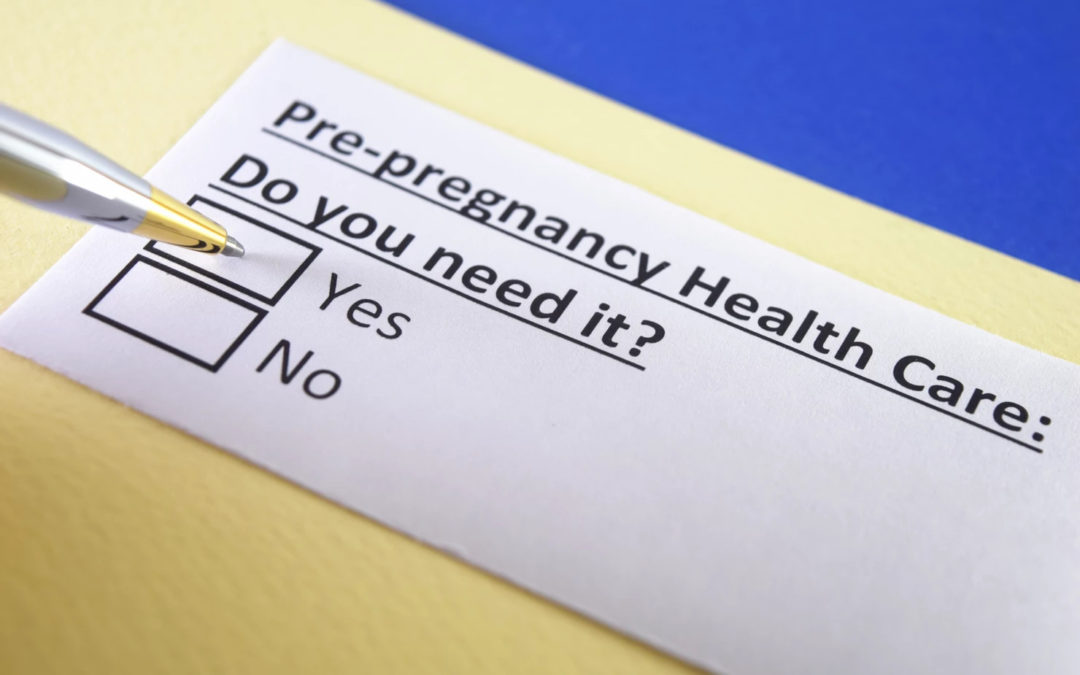We all know the importance of prenatal care during pregnancy, but many people do not realize the importance of seeing a healthcare provider for pre-pregnancy or preconception care. It may seem excessive, however, preconception care can help increase the chance for conception, increase likelihood of a healthy pregnancy and reduce risk for miscarriage and birth defects. The following are components of a thorough preconception visit:
Review of Medical, Surgical and Psychiatric Histories
Many chronic medical conditions such as diabetes, thyroid disease, hypertension and psychiatric illness have implications for pregnancy and should be optimally managed before pregnancy. In some circumstances, a referral to a maternal-fetal medicine specialist is warranted prior to conception.
Review of Current Medications
All prescription and non-prescription medications as well as herbal and nutritional supplements should be reviewed. If you are taking any products that could potentially cause harm to a pregnancy, contraception should be used until a plan has been made with your provider to discontinue the product and/or substitute a safer alternative.
Review of Family and Genetic History
A family history for you and your partner for genetic disorders, birth defects, mental disorders and breast, ovarian, uterine and ovarian cancers should be obtained. If indicated, counseling regarding disease inheritance and course will be offered as well as possible referral to genetic counseling. You will likely also be offered recessive genetic carrier screening to see if you and your partner are carriers for diseases you could potentially pass to your offspring.
Immunization Status
Immunization history should be obtained for Tdap, hepatitis B, influenza, varicella and measles-mumps and rubella. Often, blood will be drawn to check immunization status. Varicella and rubella are vaccine-preventable illnesses that can be devastating to a fetus if obtained during pregnancy. Therefore, if you are not immune to these diseases, you will be encouraged to get vaccinated prior to pregnancy (these vaccines cannot be given during pregnancy; you will need to wait a month to conceive after being vaccinated). An annual influenza vaccine is strongly encouraged for everyone. Other vaccinations may be recommended based on your personal health, lifestyle and occupational risks.
Infectious Disease Screening
The need for screening for gonorrhea, chlamydia, syphilis and HIV will be reviewed and counseling regarding reduction in STI risk will be provided as needed. If you and/or your partner are at risk for exposure to certain infectious diseases such as Zika virus, you will be counseled regarding travel restrictions and appropriate waiting time before attempting pregnancy. If you are living with HIV or another chronic infectious disease, a detailed discussion of interventions to reduce the risk of perinatal transmission, ways to optimize long-term health, and the possible effects of medications on the fetus will take place.
Substance Use Assessment
Your use of alcohol, nicotine products, and drugs, including prescription opioids and other medications used for nonmedical reasons will be reviewed. There are well known adverse effects to the fetus from the use of many substances during pregnancy. You should be offered resources and/or referrals for discontinuing substances prior to trying for pregnancy.
Nutritional Status
Your diet should be assessed to make sure you are consuming adequate daily allowances of essential vitamins and minerals such as calcium, iron, vitamin A, vitamin B12, vitamin B and vitamin D among others. Folic acid supplementation (for most women 400-800mcg per day) should be started prior to trying to conceive to reduce risk of neural tube defects. Your diet should be reviewed to determine risk for foodborne illness such as listeriosis. If you suffer from an eating disorder, malabsorptive gastrointestinal disease or have had gastric bypass surgery, you may require special vitamin/mineral supplementation and/or referral to a nutritionist.
Body Weight/BMI
Achieving a BMI within the healthy range is encouraged prior to pregnancy. High or low BMI is associated with infertility and maternal and fetal pregnancy complications. Your healthcare provider should be able to provide you with resources to assist in achieving your weight goals.
Exercise and Physical Activity
Moderate levels of exercise pre pregnancy, during pregnancy and in the postpartum period are encouraged for most women. You will be encouraged to take measures to avoid hyperthermia, stay hydrated and sustain caloric intake, especially if you exercise at a competitive or more intense level.
Environmental and Occupational Exposures
Mounting evidence suggests there are reproductive and pregnancy risks associated with environmental pollutants, workplace exposures, and endocrine disruptors. Often, damage has already occurred by the time a woman finds out she is pregnant. The pre-pregnancy visit can help identify and avoid exposures to potentially toxic substances both in the home and workplace (examples include plastics with bisphenol-A, pesticides, lead paint, asbestos, organic solvents, heavy metals, biologics and radiation).
A thorough pre-pregnancy visit with a health care provider such as your primary care provider, OB/GYN or fertility specialist can go a long way in helping avoid fertility problems and increasing the likelihood of a healthy pregnancy for both mom and baby.
REFERENCES:
WebMD, “Your Pre-Pregnancy Check Up”, https://www.webmd.com/baby/pre-pregnancy-checkup#1
ACOG and ASRM Committee Opinion #762, “Prepregnancy Counseling” https://www.asrm.org/globalassets/asrm/asrm-content/news-and-publications/practice-guidelines/for-members/prepregnancy_counseling.pdf

